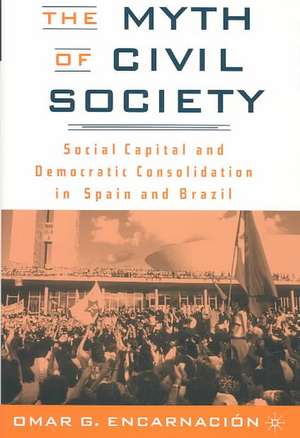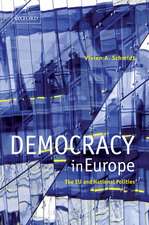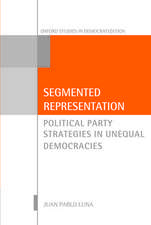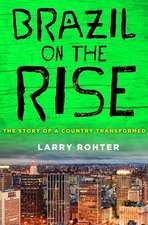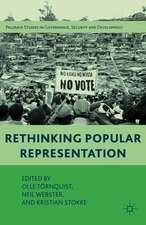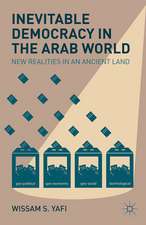The Myth of Civil Society: Social Capital and Democratic Consolidation in Spain and Brazil
Autor O. Encarnaciónen Limba Engleză Hardback – 13 noi 2003
| Toate formatele și edițiile | Preț | Express |
|---|---|---|
| Paperback (1) | 380.84 lei 6-8 săpt. | |
| Palgrave Macmillan US – 13 noi 2003 | 380.84 lei 6-8 săpt. | |
| Hardback (1) | 386.99 lei 6-8 săpt. | |
| Palgrave Macmillan US – 13 noi 2003 | 386.99 lei 6-8 săpt. |
Preț: 386.99 lei
Nou
Puncte Express: 580
Preț estimativ în valută:
74.07€ • 80.49$ • 62.26£
74.07€ • 80.49$ • 62.26£
Carte tipărită la comandă
Livrare economică 21 aprilie-05 mai
Preluare comenzi: 021 569.72.76
Specificații
ISBN-13: 9781403962263
ISBN-10: 140396226X
Pagini: 233
Ilustrații: IX, 233 p.
Dimensiuni: 127 x 203 x 19 mm
Greutate: 0.39 kg
Ediția:2003
Editura: Palgrave Macmillan US
Colecția Palgrave Macmillan
Locul publicării:New York, United States
ISBN-10: 140396226X
Pagini: 233
Ilustrații: IX, 233 p.
Dimensiuni: 127 x 203 x 19 mm
Greutate: 0.39 kg
Ediția:2003
Editura: Palgrave Macmillan US
Colecția Palgrave Macmillan
Locul publicării:New York, United States
Cuprins
PART I: THE INTELLECTUAL TERRAIN Introduction The Revival of Civil Society PART II: SPAIN:m WEAK CIVIL SOCIETY, STRONG DEMOCRACY Spanish Civil Society in Transition Politics Political Institutions and Democratization in Spain PART III: BRAZIL: STRONG CIVIL SOCIETY, WEAK DEMOCRACY Brazilian Civil Society in Transition Politics Political Institutions and Democratization in Brazil PART IV: COMPARATIVE PERSPECTIVES Civil Society Re-considered
Recenzii
"The Myth of Civil Society is well worth reading for experts and undergraduates alike. On the one hand, it offers us careful, comparative case studies of Spain and Brazil. On the other, it offers us evidence that both our faith and our massive investments in civil society might be misplaced. Not everyone will agree with the author's arguments but all will benefit from exposure to them. From its title, to its final page, this book makes exceptionally engaging reading." - Nancy Bermeo, Professor of Politics, Princeton University
"A thought-provoking examination of the relationship between civil society development and democratization. Through illuminating case studies of Spain and Brazil, Encarnación cuts through the many accumulated myths about civil society and reaches provocative conclusions about the primary importance of efficient and stable political institutions for the development of social capital, civil society, and democracy. This is a significant and highly useful book." - Thomas Carothers, Carnegie Endowment for International Peace
"This excellent book presents a long overdue critique of the inflated and empirically unsubstantiated claims frequently made concerning the importance of civil society in the consolidation and qualitative deepening of democratic regimes. It correctly refocuses our attention on political institutions and actors as the key agents that forge the 'social capital' that helps to sustain democratic regimes, and itassesses empirical evidence (particularly from the paradigmatic contrasting cases of Spain and Brazil) that challenges the frequent
assertion that high aggregate levels of associational membership, per se, are crucial for the health of democracy. This book should be of considerable interest both to scholars, and to those in NGOs and government agencies involved in the encouragement of democracy around the world. It is a welcome antidote to the conventional wisdom that has been widely accepted in an uncritical and unwarranted manner in recent years." - Richard Gunther, Ohio State University
"A thought-provoking examination of the relationship between civil society development and democratization. Through illuminating case studies of Spain and Brazil, Encarnación cuts through the many accumulated myths about civil society and reaches provocative conclusions about the primary importance of efficient and stable political institutions for the development of social capital, civil society, and democracy. This is a significant and highly useful book." - Thomas Carothers, Carnegie Endowment for International Peace
"This excellent book presents a long overdue critique of the inflated and empirically unsubstantiated claims frequently made concerning the importance of civil society in the consolidation and qualitative deepening of democratic regimes. It correctly refocuses our attention on political institutions and actors as the key agents that forge the 'social capital' that helps to sustain democratic regimes, and itassesses empirical evidence (particularly from the paradigmatic contrasting cases of Spain and Brazil) that challenges the frequent
assertion that high aggregate levels of associational membership, per se, are crucial for the health of democracy. This book should be of considerable interest both to scholars, and to those in NGOs and government agencies involved in the encouragement of democracy around the world. It is a welcome antidote to the conventional wisdom that has been widely accepted in an uncritical and unwarranted manner in recent years." - Richard Gunther, Ohio State University
Notă biografică
OMAR G. ENCARNACIÓN is Associate Professor of Political Studies at Bard College, USA.
